The Ultimate Mongolian Journey: Explore Almost Everywhere and Experience Everything in Mongolia – A Once-in-a-Lifetime Adventure
Embark on a journey that takes you across Mongolia, immersing yourself in its diverse landscapes, rich cultures, and timeless traditions. This is truly a once-in-a-lifetime experience.
“North Mongolia: A Mystical Beginning”
Your journey kicks off in Northern Mongolia, offering a profound immersion into the captivating world of reindeer herders and nomadic families. Among the vast, pristine wilderness, you’ll encounter a lifestyle deeply rooted in ancient traditions and harmonious coexistence with nature. Wander through the wilds of the Taiga on reindeer and horseback, dwell with the mystical Tsaatan people to experience their primal way of life, spend nights in a traditional teepee, and wake to misty dawns enveloping the breathtaking scenery of Northern Mongolia.
“Central Mongolia: The Heart of the Land”
The second leg of your trip brings you to the heart of Mongolia. Here, you’ll explore an ancient extinct volcano, celebrate the authentic Naadam Festival with locals, and relax in rejuvenating hot springs. Spend time with local families, experience their daily lifestyle, and learn how to survive in the middle of nowhere. This is where tradition meets adventure.
“The Gobi Desert: A Land of Wonders”
Next, you’ll venture into the iconic desert land of the Gobi. The Flaming Cliffs, one of the most famous paleontological sites in the world, were where dinosaur eggs and skeletons were first discovered. At Khongor Sand Dunes, not only will you witness the tallest dunes in Mongolia—towering even higher than those of the Sahara—but you’ll also ride the iconic Mongolian Bactrian camels. Beyond the dunes lies the surreal landscape of the White Stupa, a geological wonder that feels like walking on the surface of Mars, perfect for awe-inspiring photographs.
“Western Mongolia: A Cultural Finale”
The final chapter of your journey takes you to Western Mongolia, home to the ancient art of eagle hunting. This unique tradition, unlike anything else in the world, thrives in the majestic Altai region, also known for Mongolia’s highest mountains. Further exploration leads you to the stunning “Baga Turgen” valley with its Twin Lakes, a destination that epitomizes the beauty of the west. Here, you’ll meet eagle hunter families, learn about their rich culture, and experience life in one of Mongolia’s most remote and fascinating regions.
This ultimate journey through Mongolia offers unparalleled experiences, from the mystic Taiga to the towering sand dunes, the vibrant Naadam Festival to the timeless art of eagle hunting. It’s a journey that will leave you with memories to last a lifetime.

The adventure begins with an early domestic flight to Murun, arriving in the morning. Upon arrival, the team consisting of a tour guide, driver, and cook will greet you, and then you’ll embark on a journey northward to explore the Reindeer herders in the Taiga. Along the way, you’ll traverse stunning mountainous terrain and serene valleys, passing through the local town of Ulaan Uul. As you drive through a pass near the town, you’ll encounter the picturesque 13 shamanic “Ovoo,” symbolizing the entrance to the land of shamans. Furthermore, will visit local nomadic family in Darkhad village and get involved in their cultures. For the next few days, you’ll be accommodated in comfortable, high-quality expedition tents, and our skilled cook will prepare delicious meals for you.(B/L/D)
Note: There are no guesthouses or tourist camps in the north and we’ll set up our private camp, tents. Our talented cook will prepare 3 times meals for you every day. You’ll be provided with, mattresses, sleeping bags, and all camping equipment. In certain places, there aren’t proper bathroom amenities, so you’ll be roughing it like you’re camping outdoors. Some spots might have outhouses made of wood.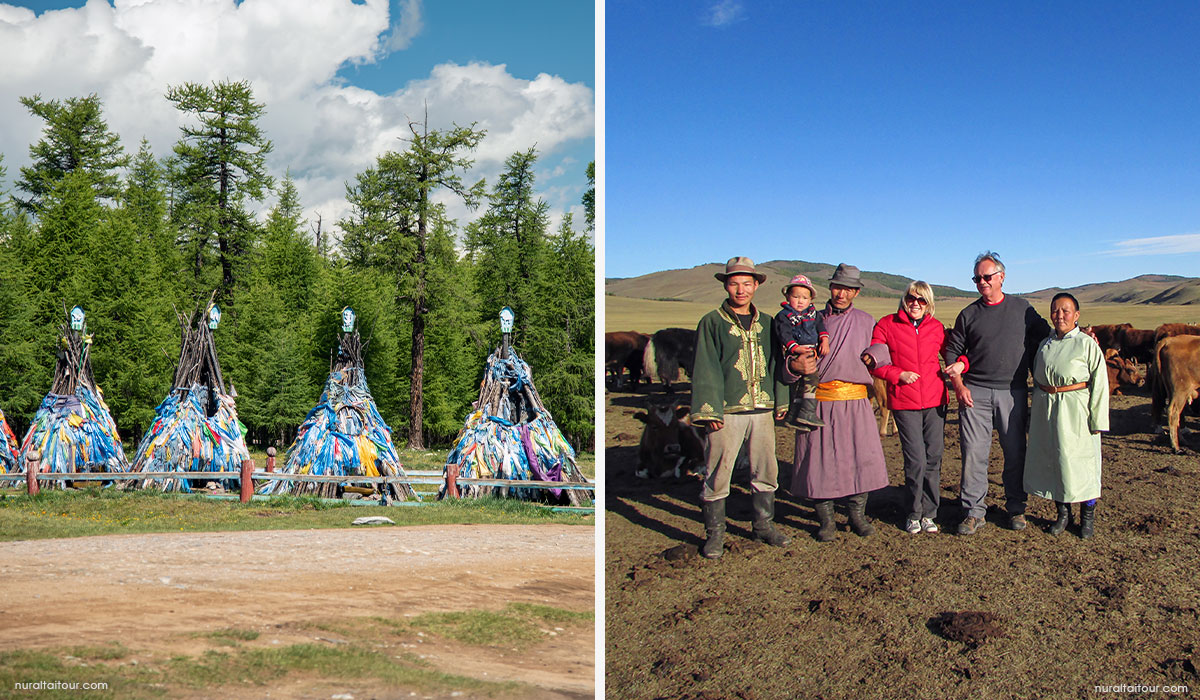
Following a delightful morning in the Ulaan-Uul village, your journey continues through the captivating Darkhad valley to reach Tsagaan Nuur town. Upon arrival at Khogorog, you’ll rendezvous with our local horse crew, marking the start of an exceptional equestrian adventure the following day.(B/L/D)
You’ll be embarking on a 6-7 hour horse trek to visit the Reindeer herder family today. Comfortable, soft saddles will be provided for the journey. You’ll need to pack only essential items for the next three days, as you can’t carry too much on the luggage horses. Two horses will be allocated for carrying foodstuff, kitchen essentials, sleeping bags, and mattresses. Once the horse guides have loaded all the luggage onto the carrier horses, you’ll begin the trek to the Taiga. You’ll ride through dense forests, swampy meadows, and cross rivers for approximately 30 km until you reach the Reindeer herders in the evening. Will have a packed lunch along the way. You’ll conclude your day by meeting the Tsaatan people, who are the local Reindeer herders. “Tsaatan” means “Reindeer Herder,” derived from “Tsaa” or “Tsaa-Buga” for Reindeer/Deer and “tan” as a suffix similar to “-er” in English (e.g., driver, cleaner). Tonight, you’ll stay in the traditional tent teepee of the Tsaatan people. Overnight.(B/L/D)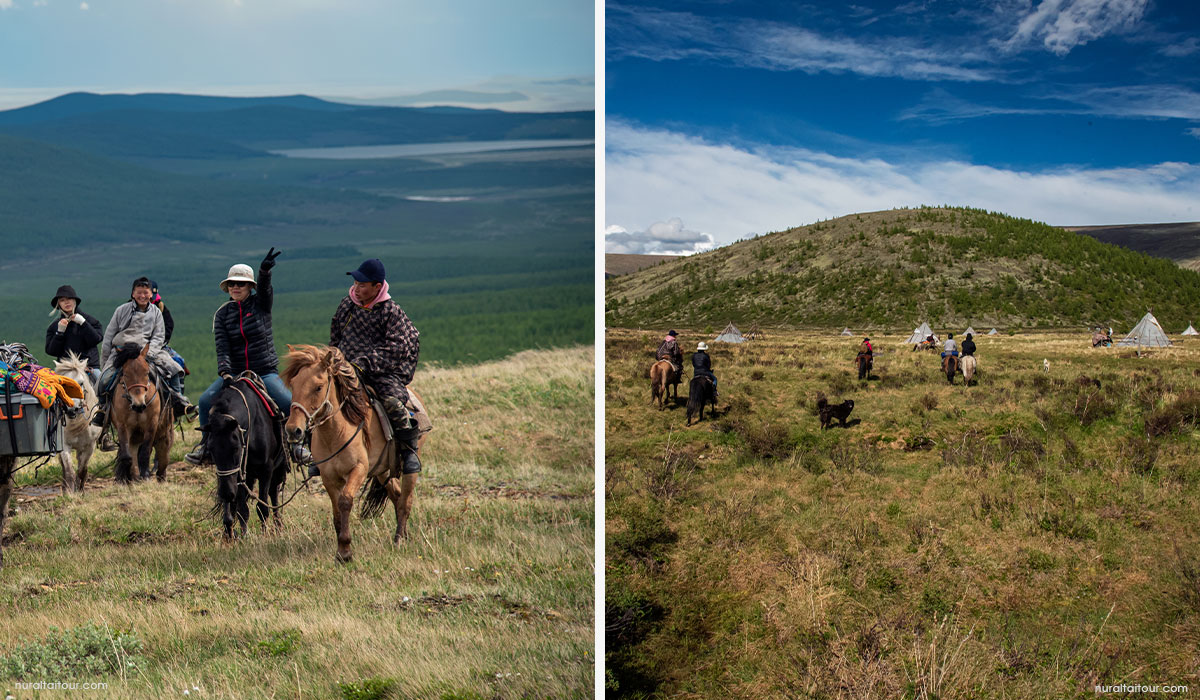
You’ll spend the day with the Reindeer herder tribe. Ethnically, these individuals are Tuvans, also referred to as Dukha people. Their language, religion, and culture differ slightly from typical Mongols. They primarily speak Tuvan, but many young people have begun to use Mongolian as well. Their main religious practice is Shamanism. They use reindeer like horses and consume their milk as regular milk. You’ll not only learn about their cultures but also actively participate in them. You can try your hand at milking reindeer and ride them in the surrounding areas. For the remainder of the time, relax in the serene surroundings of the Taiga. Overnight.(B/L/D)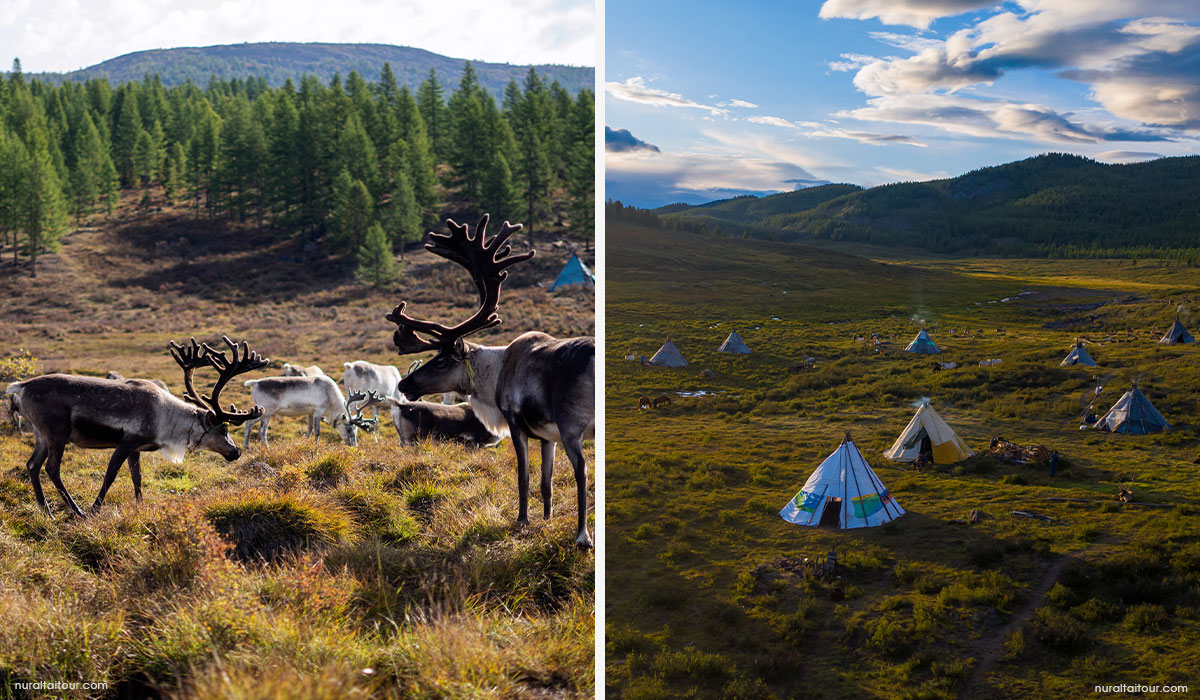
So, we’ll head out from Khogorog early in the morning and drive about 350 km off-road, which should take us 7-8 hours to reach the lakeshore. Khuvsgul Lake, also known as Blue Pearl Lake, is surrounded by forested mountains and stands as one of Mongolia’s largest lakes. We’ll arrive at the tourist camp in the evening, where there are bathroom facilities. Chill out at the tourist camp.(B/L/D)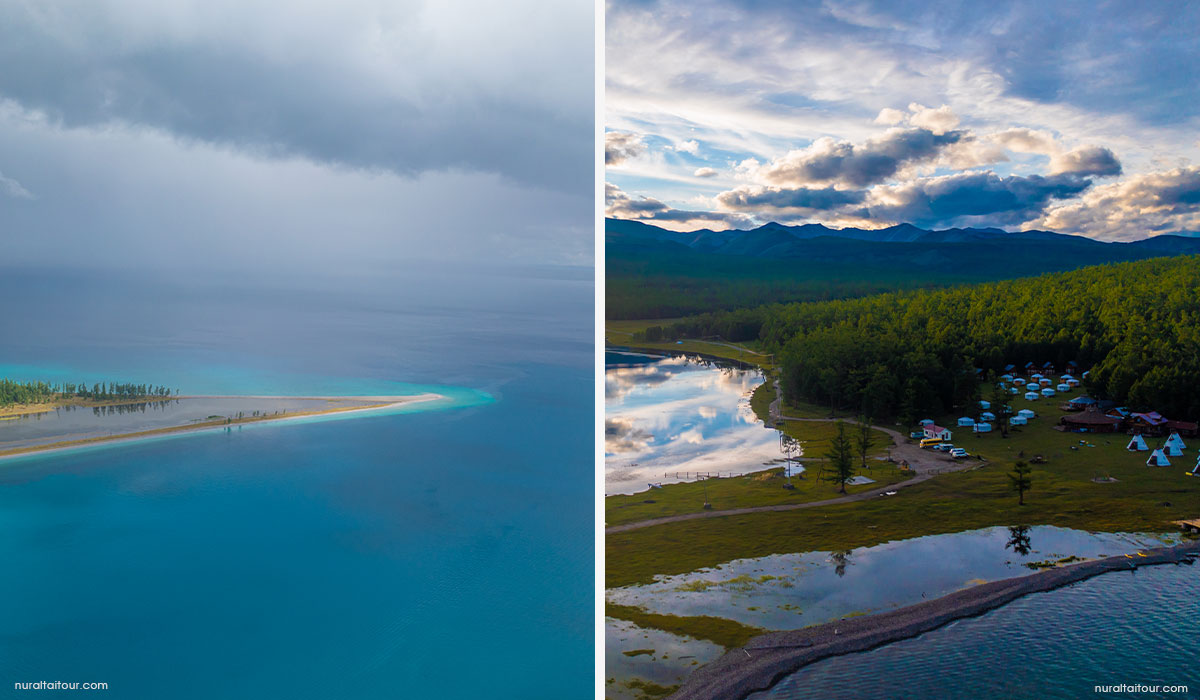
You’ll make your way to the Khorgo volcano extinct, Terkh white lake, central Mongolia. An extinct volcano in central Mongolia, located within the Khorgo-Terkh National Park. It last erupted about 8,000 years ago, leaving behind a lava field and a 200-meter-wide crater, which is a popular spot for hiking and scenic views. Terkhiin Tsagaan Lake, this freshwater lake lies near the Khorgo volcano in central Mongolia. Surrounded by scenic landscapes, it’s renowned for its crystal-clear waters, rich wildlife, and camping spots, making it a popular destination for nature lovers and outdoor activities. We’ll spend the night at tourist Ger camp.(B/L/D)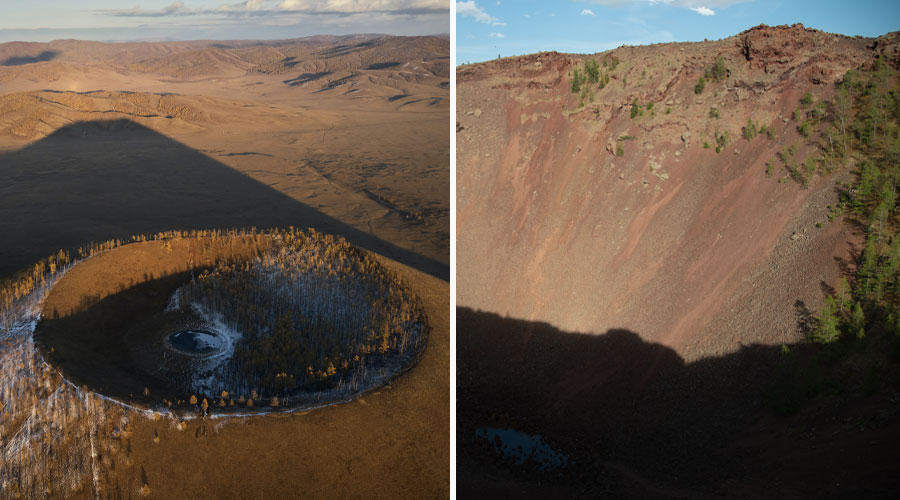
Leave White Lake to Tsenher Hot springs which is natural, mineral-rich hot springs known for their therapeutic properties. Surrounded by lush valleys and forests, they offer a relaxing retreat in a beautiful natural setting, with onsite pools and camps for visitors to enjoy the warm, healing waters. Popular for unwinding, it’s a favored stop for both locals and travelers seeking relaxation and scenic views.Overnight at tourist camp.(B/L/D)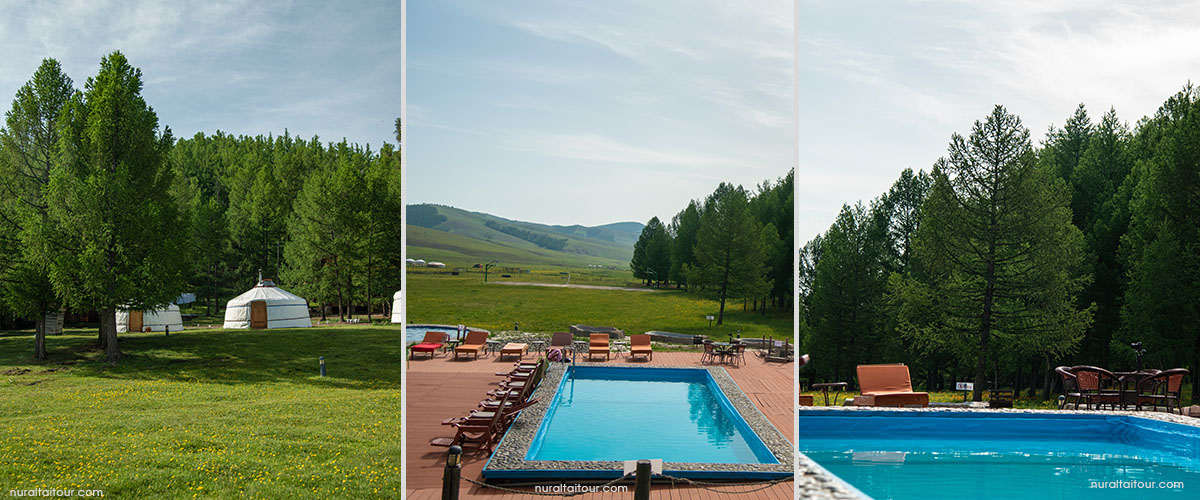
In the morning, we’ll drive for about an hour to the place where “Naadam Festival” is held. The authentic “Naadam Festival” in the Mongolian countryside offers a unique, traditional experience compared to the larger, urban celebrations in Ulaanbaatar. This smaller-scale event typically occurs in local communities, preserving the festival’s essence as a celebration of Mongolian culture and heritage.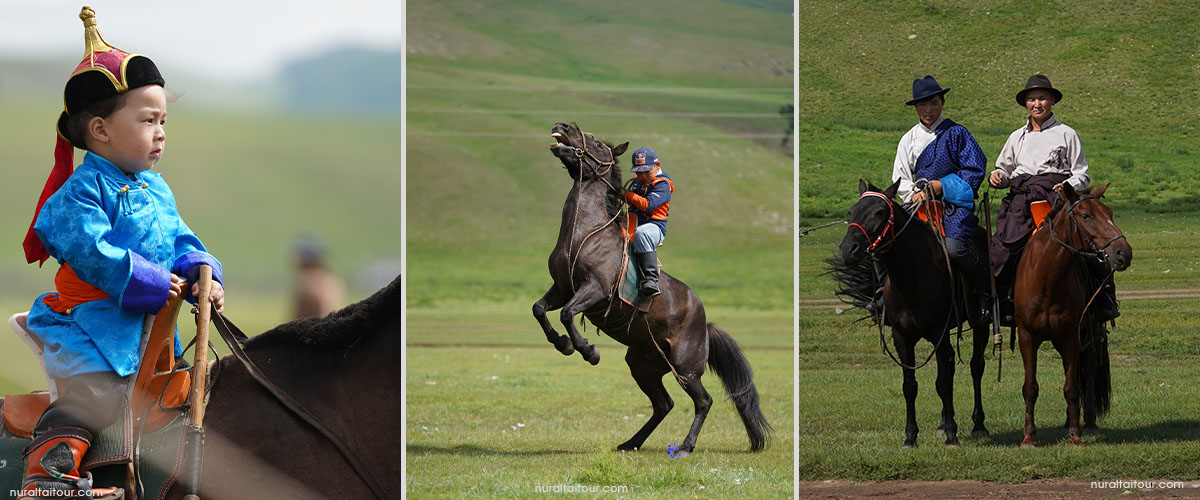 The Three Manly Games; The festival features “traditional wrestling”, “horse racing”, and “archery”, showcasing skills deeply rooted in Mongolia’s nomadic traditions. “Wrestling“; Matches are held in open fields, with traditional songs and ceremonies accompanying the bouts.
The Three Manly Games; The festival features “traditional wrestling”, “horse racing”, and “archery”, showcasing skills deeply rooted in Mongolia’s nomadic traditions. “Wrestling“; Matches are held in open fields, with traditional songs and ceremonies accompanying the bouts.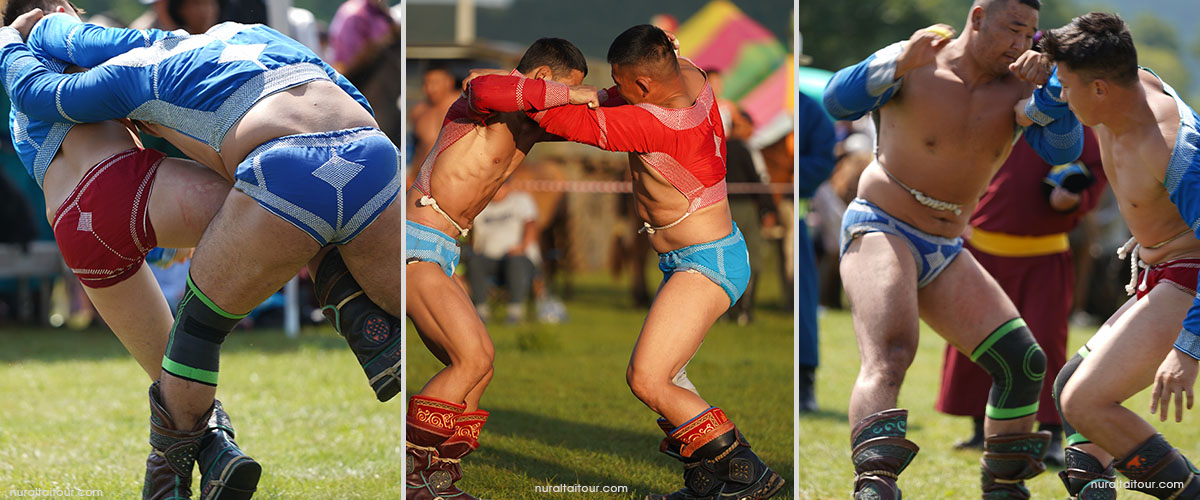 The Three Manly Games; The festival features “traditional wrestling”, “horse racing”, and “archery”, showcasing skills deeply rooted in Mongolia’s nomadic traditions. “Wrestling“; Matches are held in open fields, with traditional songs and ceremonies accompanying the bouts.
The Three Manly Games; The festival features “traditional wrestling”, “horse racing”, and “archery”, showcasing skills deeply rooted in Mongolia’s nomadic traditions. “Wrestling“; Matches are held in open fields, with traditional songs and ceremonies accompanying the bouts.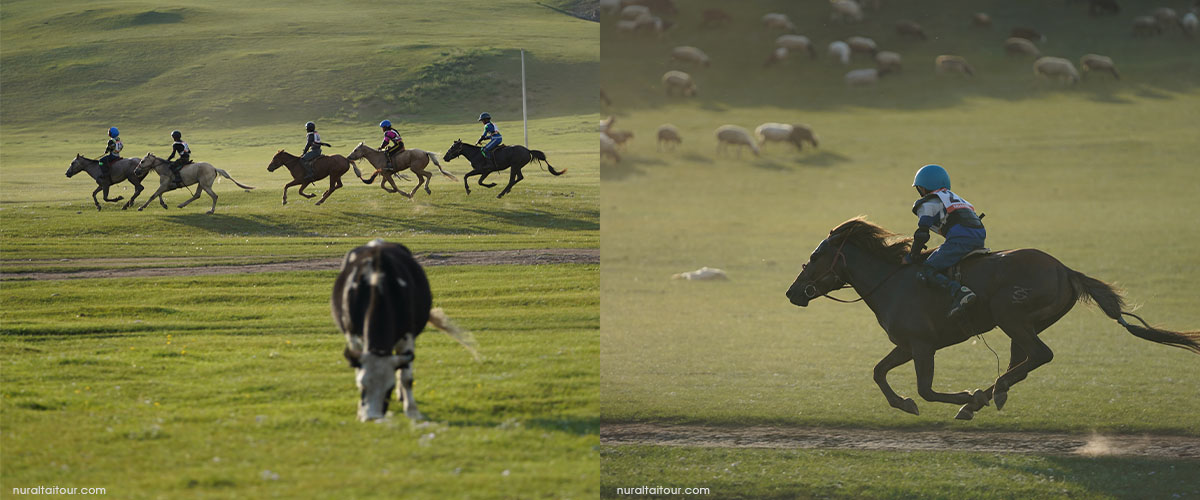 “Archery“: Traditional bows and arrows are used, often in family-based competitions.
“Archery“: Traditional bows and arrows are used, often in family-based competitions.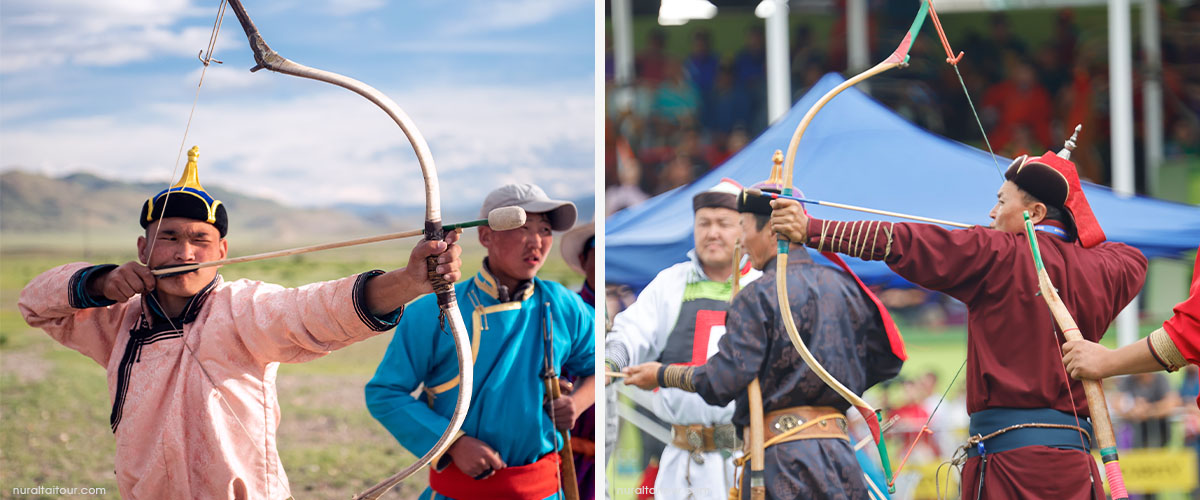 “Cultural Immersion”; Guests can enjoy local music, throat singing, traditional dance performances, and Mongolian cuisine such as “Khorkhog” (meat cooked with hot stones) and “Buuz” (dumplings), “Khuushuur”, “Tsuivan” etc. Villagers and herders come together, creating a close-knit, festive environment that’s welcoming to visitors. You’re going to have a fantastic day of your life. Arrive in the family, overnight.(B/L/D)
“Cultural Immersion”; Guests can enjoy local music, throat singing, traditional dance performances, and Mongolian cuisine such as “Khorkhog” (meat cooked with hot stones) and “Buuz” (dumplings), “Khuushuur”, “Tsuivan” etc. Villagers and herders come together, creating a close-knit, festive environment that’s welcoming to visitors. You’re going to have a fantastic day of your life. Arrive in the family, overnight.(B/L/D)
The journey carries on to meet a local nomadic family who live in the heart of Orkhon Valley about 2 hours. Here, you’ll experience the peaceful atmosphere of the Mongolian steppe while resting in the Ger dedicated to travelers. For the best experience of nomadic culture, plan on spending a night learning about nomadic agricultural practices, lifestyle, and cultural traits. You’ll immerse yourself in the culture of a nomadic family, learning how they spend their days and keep their traditions alive. Nomads are known for their hardworking nature, engaging in daily tasks such as processing milk products, tending to livestock, cleaning cattle sheds, and seeking productive pastures. You’ll have the opportunity to personally experience milking yaks, processing milk, fermenting horse milk, making dried curd, and skimming yak milk, all under the guidance of family members. Additionally, there will be a mini-tournament to test your skills against locals and fellow travelers after receiving a brief Khalkha archery course, a traditional sport in Mongolia. Other activities include herding cattle, milking cows, and transporting drinking water from a distance using a mini truck. You’ll enjoy dinner and spend the night with the nomadic family, fully immersing yourself in their way of life.(B/L/D)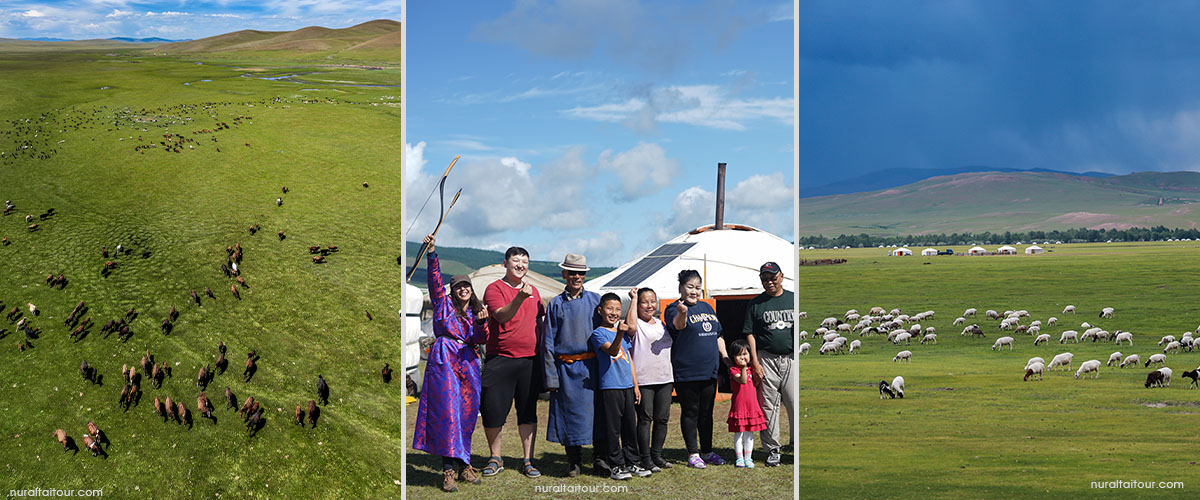
We’ll journey to the picturesque Tuvkhun temple at the mountaintop by riding horses through a stunning forested area, immersing ourselves in the serene atmosphere. We’ll arrive at a small open meadow in front of a towering rocky cliff. As we get closer to the mountaintop, the terrain becomes a bit steeper. The monastery sits on that cliff, so we’ll ascend to it using rocky steps. On the way, you’ll encounter three small temples. While exploring the monastery, you’ll come across various meditation caves and a small cave known as the “mother’s womb.” Local beliefs suggest that rolling in the womb can cleanse your body, much like being reborn. At the mountaintop, you’ll also find several ovoos and monuments dedicated to natural deities. This experience is definitely worth a try, as it offers a breathtaking display of nature from the mountaintop. Afterward, we’ll ride back to the family. Overnight.(B/L/D)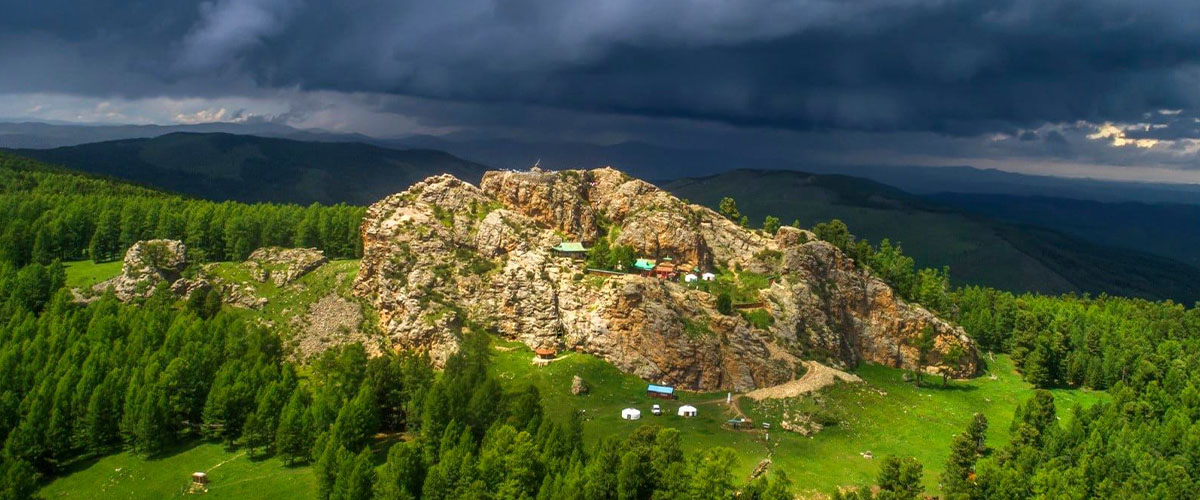
We’ll drive to the ancient Erdene Zuu monastery. Kharkhorin was the capital of the ancient Mongol Empire in the 13th century and is now one of the historical towns of Arkhangai province.
Dates back to the XIII Century, construction of the “Kharkhorum” was completed at the time of Chinggis Khaan’s successor Ogodei Khaan and it was a political and trade center through which passed the legendary Silk Road, the main commerce network of the whole of Eurasia. Then we’ll visit Erdenezuu Khiid – the oldest monastery in Mongolia. Erdene Zuu Monastery was built on the ruins of the ancient capital using its stones after the introduction of Buddhism in Mongolia at the end of the XVI century. Now Erdene Zuu Khiid is considered by many to be the most important monastery in the country and a museum that is open to tourists. Overnight in a tourist camp.(B/L/D)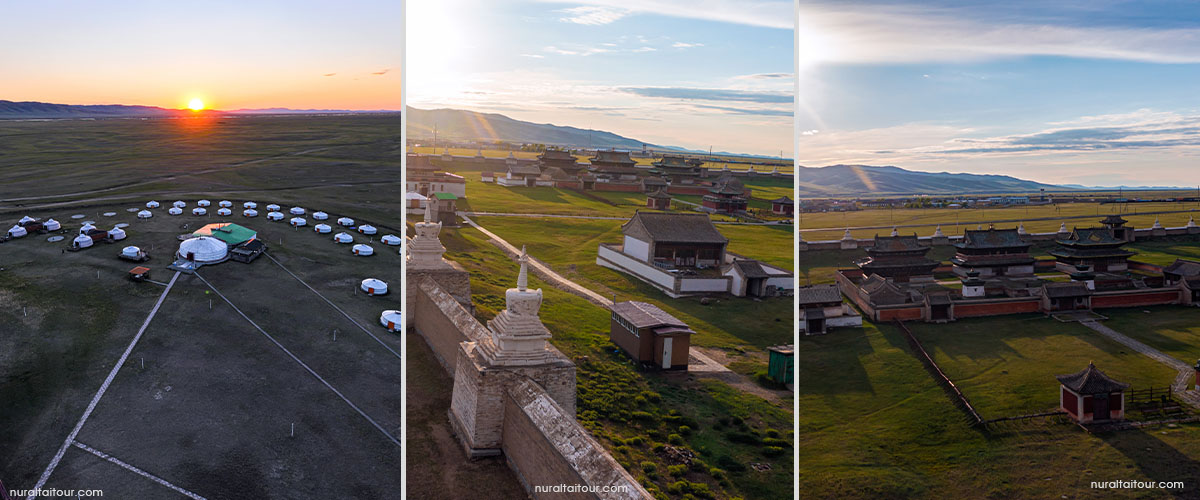
You’ll depart from green area to Gobi, thus, we will reach the Ongi Temple ruins, which once stood as one of Mongolia’s largest monasteries, hosting over 1000 monks at its peak. Unfortunately, many sections of the Ongi monastery were completely demolished in 1939 during anti-religious purges. Given the considerable distance between Kharkhorin and the Flaming Cliffs, attempting it in a single day would entail a very long drive. Therefore, you’ll spend the night relaxing at the Ongi temple ruins. Take a leisurely evening stroll through the area and spend the night at a lovely tourist camp.(B/L/D)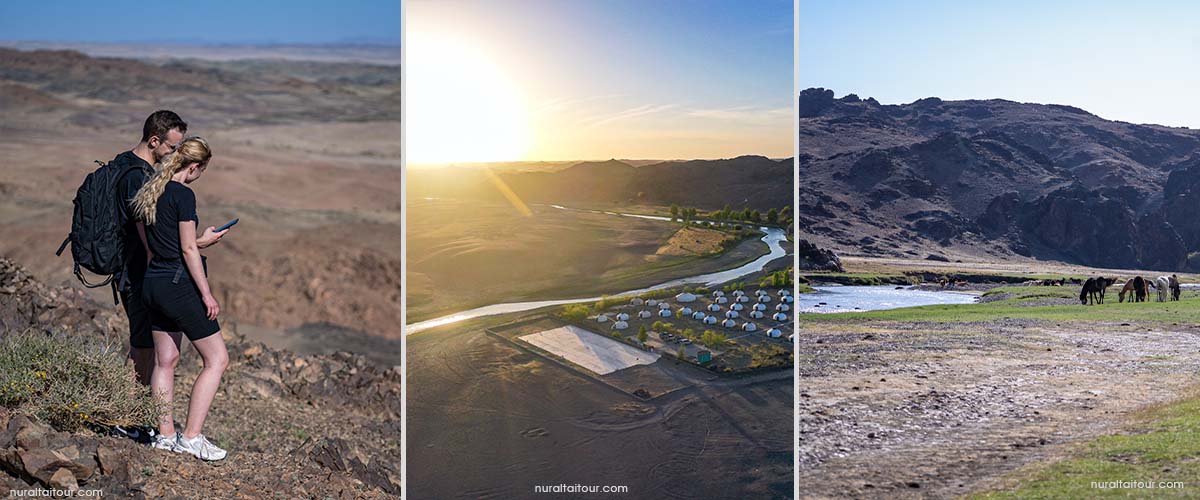
You’ll drive approximately 200 km distance for about 4 hours and arrive in Bayanzag which is a famous archaeological site with its rich fossil finds, including dinosaur eggs and skeletons, which provide valuable insights into prehistoric life. Its history is deeply connected with paleontological discoveries made by American paleontologist Roy Chapman Andrews in the early 20th century. You’ll wander through the terrain where dinosaurs once roamed, observing saksaul trees and other typical desert vegetation. The region is also famously known as Flaming Cliffs. The Flaming Cliffs are named for the vibrant red and orange tones that light up the landscape during sunrise and sunset, forming a breathtaking visual display. Overnight at the tourist camp with a hot shower, and white blankets.(B/L/D)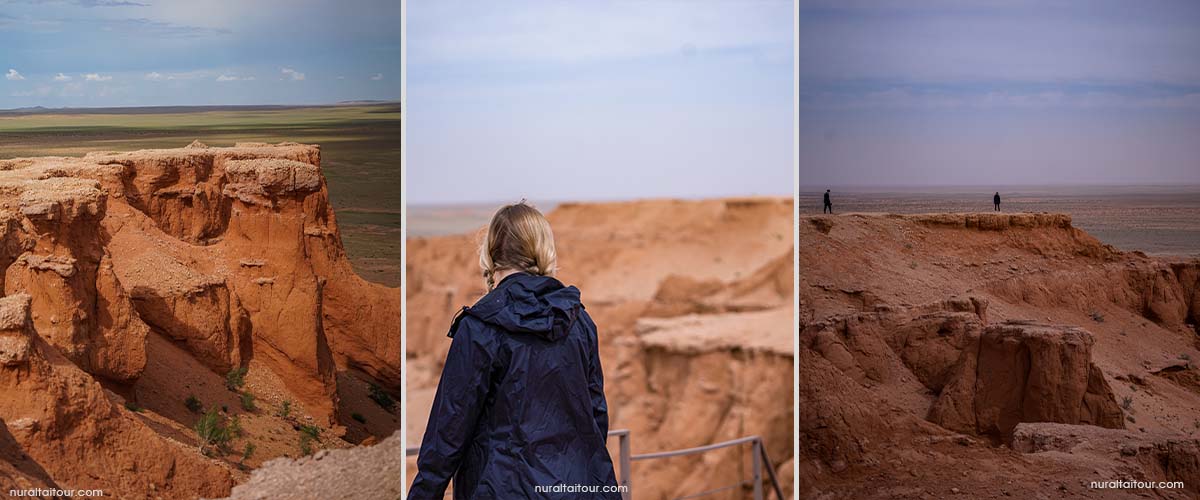
Embark on a journey to Khongoryn Els, the largest sand dune in Mongolia, towering up to 300 meters high. The drive covers about 200 kilometers, taking roughly 4 to 5 hours to reach the destination. You’ll visit a local camel herder family, where you’ll also experience riding Mongolian Bactrian camels. As your first experience of Gobi, you’ll explore the Khongor sand dune on the camelback. The dual-humped Bactrian camels offer a smooth riding experience due to their leisurely and gentle pace and our camel guide ensuring a safe journey through the sandy terrain. You’ll also get to discover the beauty of the Seruun-Bulag oasis nestled amidst the dunes. One of the highlights of the Khongor sand dune is climbing Duut Mankhan, also known as Sounding Dunes, for the sunset. It’s very challenging but quite safe. Climbing up is a blast, as the dune’s steep slope makes your feet slip with each step. Once you reach the summit, you’ll be treated to a breathtaking view of nature, with unusual vibrant hues of the setting sun. It’s typical for cloud cover in the desert to be sparse, which keeps the sky clean. This gives you a chance to gaze at the countless stars that adorn the night sky. Overnight at the tourist camp with a hot shower, and white blankets.(B/L/D) 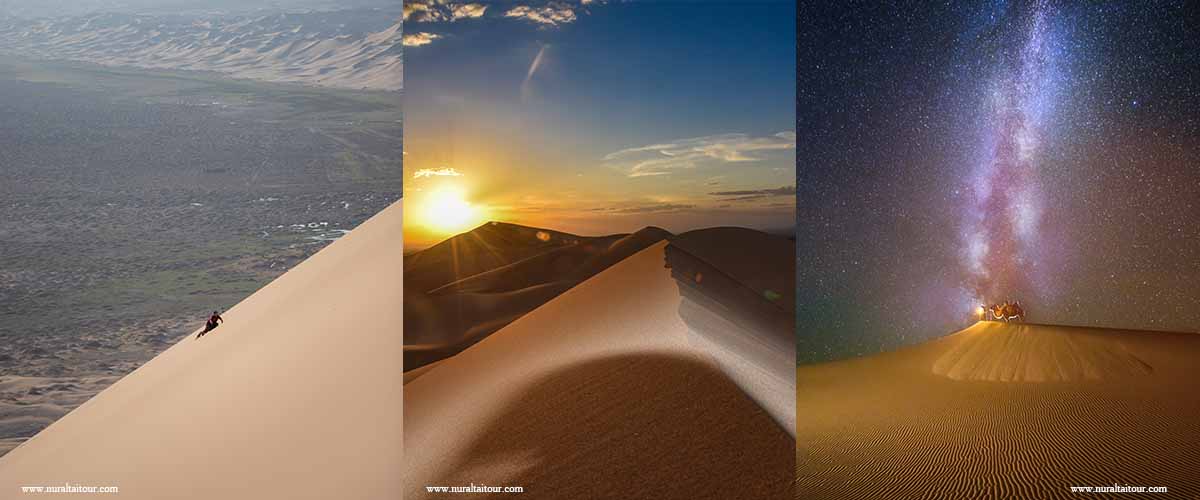
You’ll head to the Yol Valley, also known as Lammergeier Valley, in the Gobi Gurvan Saikhan Mountain National Park /Three Beauties of the Gobi/ for about 3-4 hours. This valley is a beautiful spot nestled in the Gobi desert, with thick ice almost year-round. The cliffs are incredibly high, blocking much of the sunlight, which helps the snow to stick around even in the summer. If you visit before August, you’ll encounter a glacier among the rocky cliffs as you ascend towards the ravine. Exploring the valley usually takes around 2-3 hours. For the remainder of the day, you can relax at the Mongolian Ger tourist camp, where you’ll have access to a hot shower. All the Gers are equipped with comfy mattresses and crisp white blankets.(B/L/D)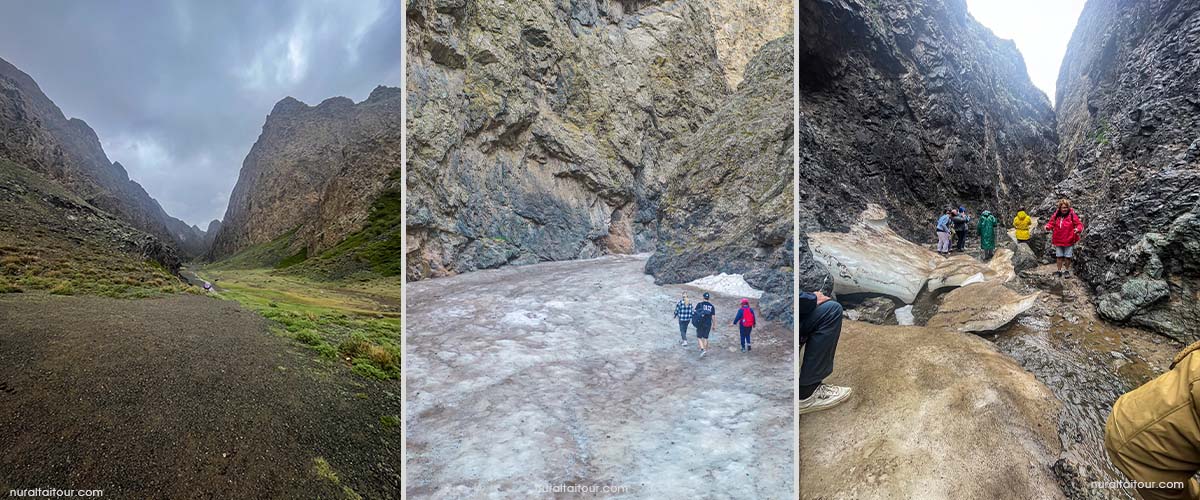
White Stupa is about 200kms distanced. Once part of the seafloor, this escarpment resembles a white stupa, earning its name Tsagaan Suvarga (white stupa). Stretching 400 meters in length and rising 60 meters with a sheer 90-degree edge, it’s quite a sight. After rainfall, water cascades down, giving it the appearance of a massive waterfall and creating a surface reminiscent of Mars. It’s the perfect time to leisurely stroll along the White Stupa, capturing stunning photos, including drone shots, especially during the sunset.(B/L/D)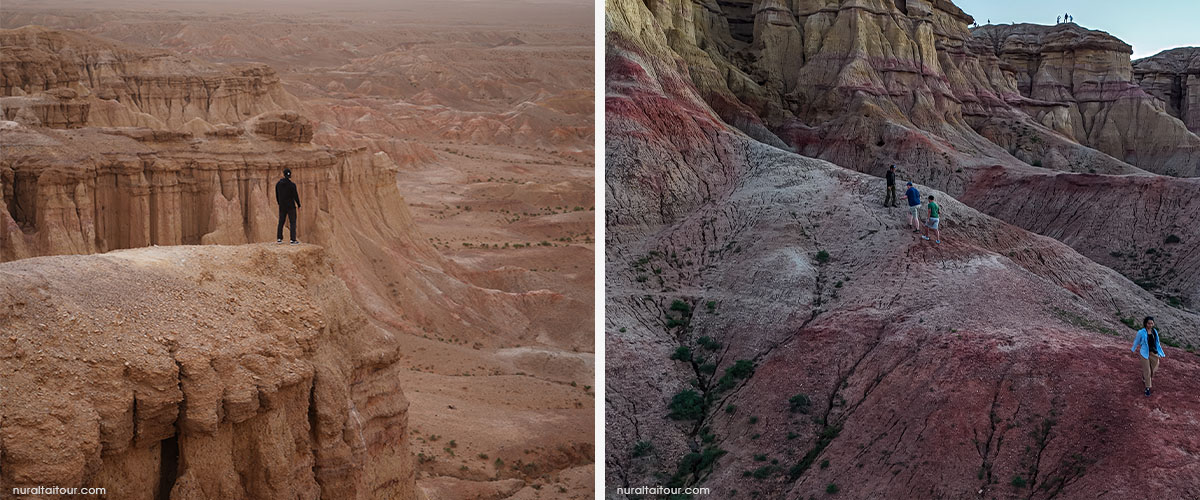
You’ll drive 5-6 hours for 450 kms and arrive in the evening in Ulaanbaatar. Overnight.(B/L)
You’ll explore the Genghis Khan Equestrian Statue, part of the Genghis Khan Statue Complex, is a 40-meter tall, stainless-steel statue of Genghis Khan on horseback, making it the world’s tallest equestrian statue. Visitors can walk to the head of the horse through its chest and neck, where they have a panoramic view. Afterward, you’ll drive back to Ulaanbaatar for about 1 hour. Relax at the hotel after the long trip. Overnight.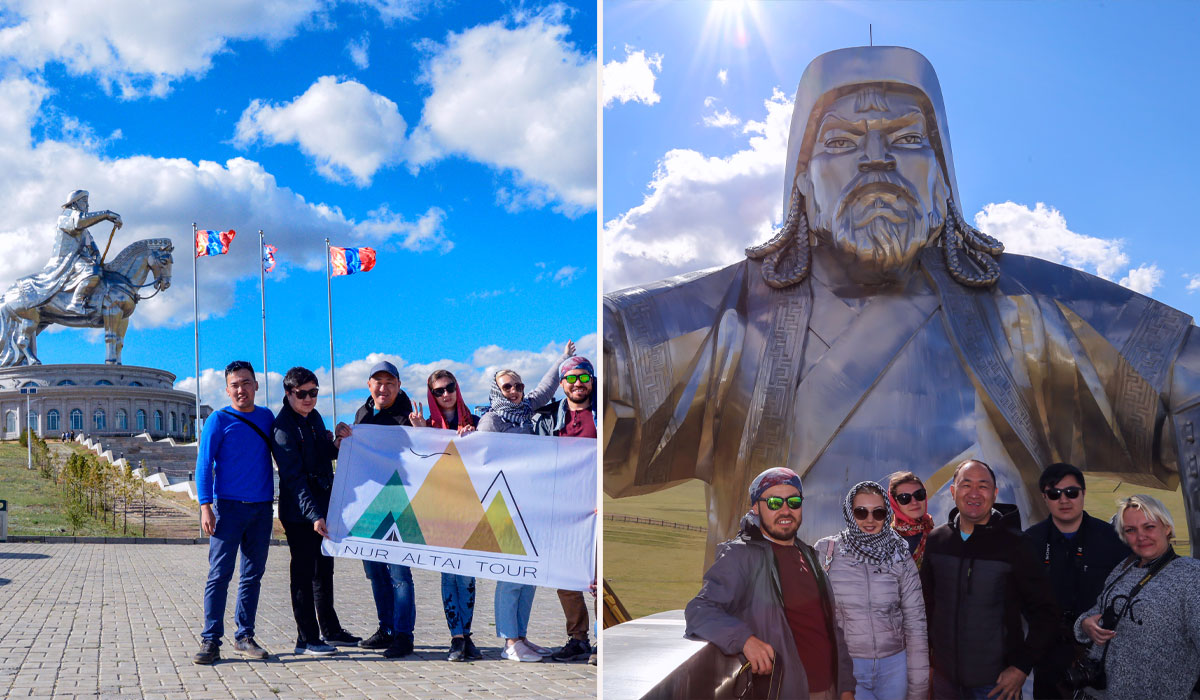
The adventure begins with an early domestic flight to Olgii, arriving in the morning. Our crew will be waiting for you at the local airport. You’ll head towards the ranger station of the Altai Tavan Bogd mountains, which is about a 5-6 hour drive. En route to the Altai mountains, you’ll traverse mountain ranges and rivers, surrounded by rocky landscapes. At some beautiful spot along the way, you’ll make a quick stop to set up camp for lunch. On the first day of your trip, you’ll start with a visit to the petroglyphs in the Tsagaan Salaa mountainas, where you’ll discover rock carvings dating back 3,000-4,000 years. These ancient carvings depict scenes with horsemen, deer, dogs, and more, offering a fascinating glimpse into the culture of early people.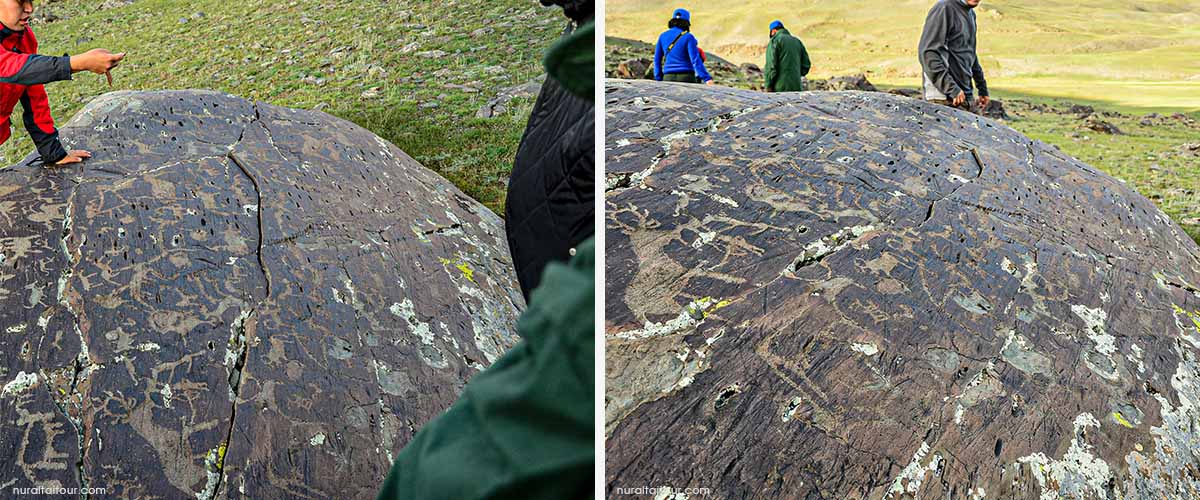 Eventually, you’ll reach the valley known as the “Oigor,” home to nomadic Kazakh families for centuries. You’ll be welcomed by a local family, known for their hospitality, allowing you to fully immerse yourself in their culture and daily life. The nomadic family takes on many daily tasks, like milking cows and yaks in the evening and making dairy products. You’ll also have the chance to try your hand at some of these activities. You’ll experience the magic of Altai mountains by staying in a traditional Mongol-Kazakh Ger. These portable, round tents encapsulate the nomadic heritage of Mongolia, offering a unique and cozy experience. It’s a perfect way to immerse yourself in the rich history and culture of this remarkable region.(B,L,D)
Eventually, you’ll reach the valley known as the “Oigor,” home to nomadic Kazakh families for centuries. You’ll be welcomed by a local family, known for their hospitality, allowing you to fully immerse yourself in their culture and daily life. The nomadic family takes on many daily tasks, like milking cows and yaks in the evening and making dairy products. You’ll also have the chance to try your hand at some of these activities. You’ll experience the magic of Altai mountains by staying in a traditional Mongol-Kazakh Ger. These portable, round tents encapsulate the nomadic heritage of Mongolia, offering a unique and cozy experience. It’s a perfect way to immerse yourself in the rich history and culture of this remarkable region.(B,L,D)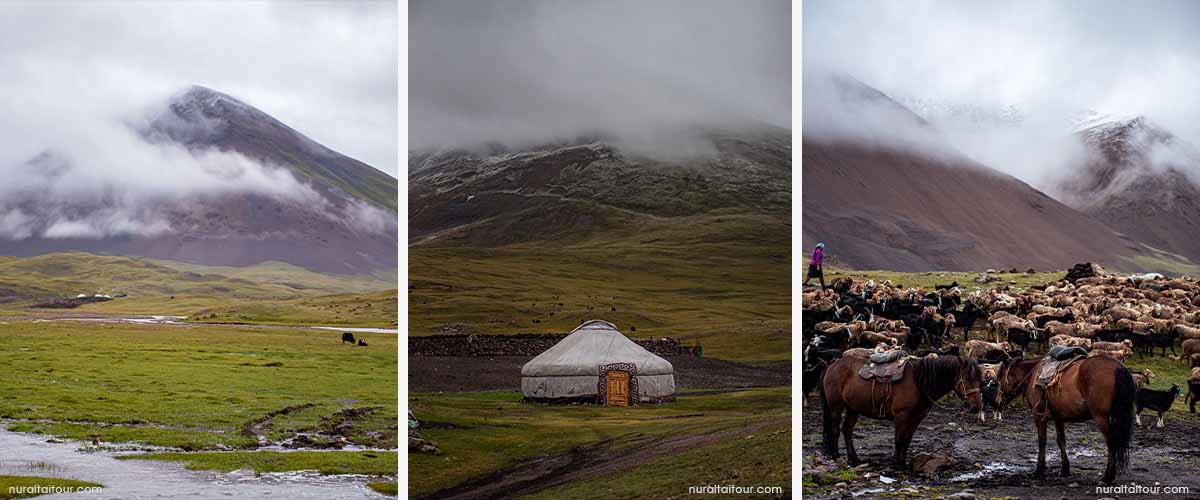
The journey continues to explore the beautiful Altai Tavan Bogd National Park for about 2 hours. The Altai Tavan Bogd boasts five perennially snow-capped peaks, with the highest named Khuiten towering at 4374 meters above sea level. Additionally, there are three substantial glaciers, the longest one spanning an impressive 20 kilometers. The final parking for the vehicles is at a sacred site on the hill where you’ll be treated to an extraordinary view of the valley landscape, providing an ideal setting for breaks to capture photos and take rests. Furthermore, you’ll enjoy hiking for 6-7 km (roundtrip) to get closer to the peaks and glaciers. Then, you’ll return to the family. Overnight in Ger.(B/L/D)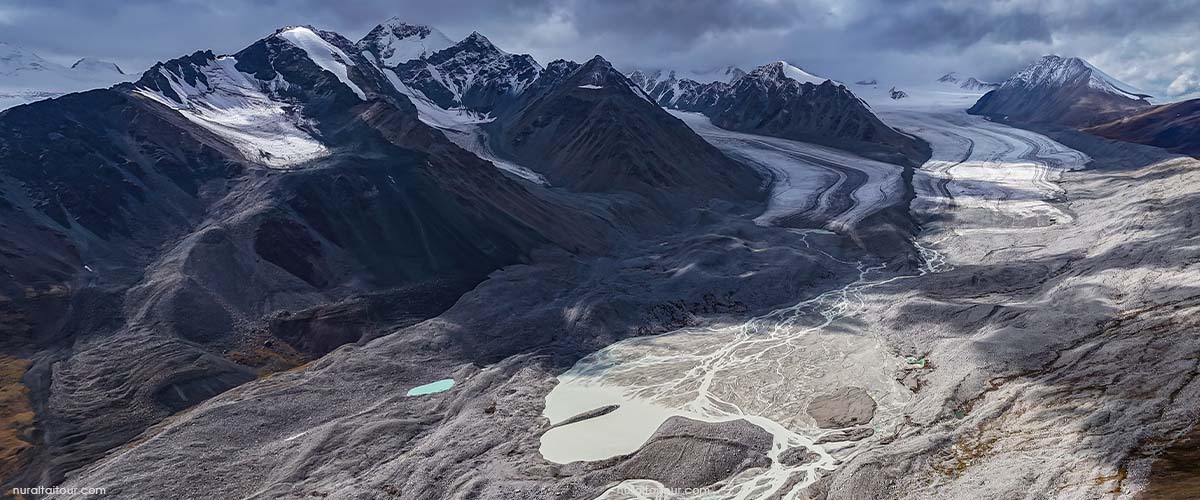
Bid farewell to the family and depart from Oigor Valley for the Twin Lakes for about 5-6 hours. As you journey towards the lakes, you notice the landscape subtly differs from the Altai mountains. You’ll explore the area with lush meadows, traverse mountains surrounded by foliage, and encounter Turkic-age human stones along the way.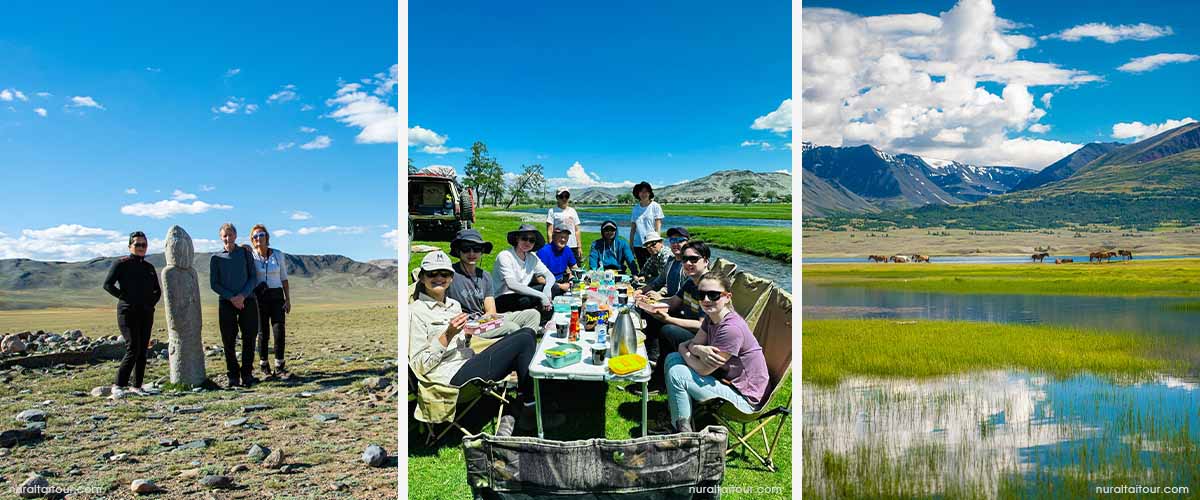 Upon reaching the destination, you’ll drive to the local Eagle Hunter family and be warmly greeted by the family members. Enjoy a peaceful dinner in the serene atmosphere. Overnight in a Ger. (B/L/D)
Upon reaching the destination, you’ll drive to the local Eagle Hunter family and be warmly greeted by the family members. Enjoy a peaceful dinner in the serene atmosphere. Overnight in a Ger. (B/L/D)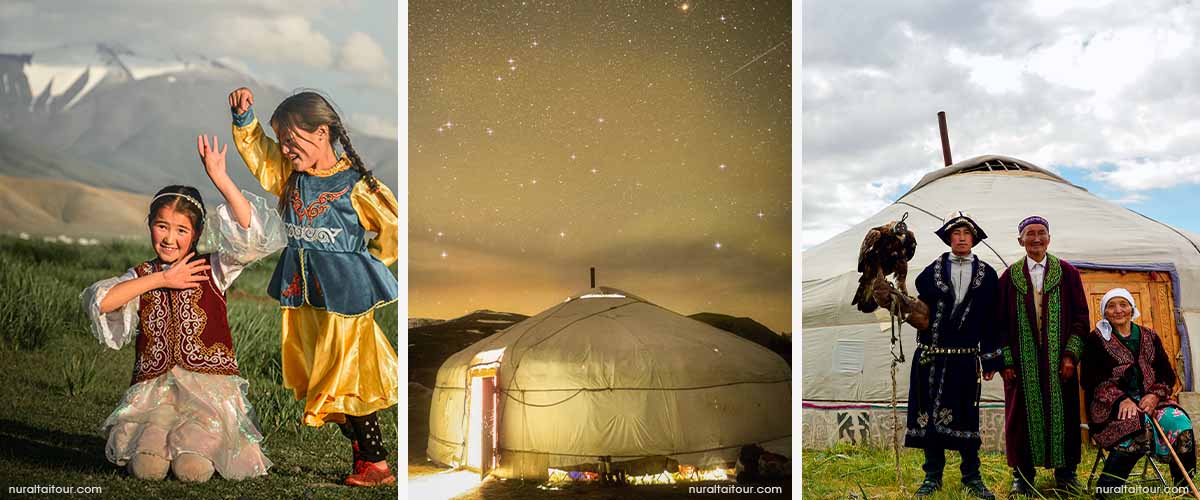
In the morning, a short drive takes you to the Baga Turgen Valley. It’s surrounded by snow-capped mountains, lush forests, rocky rivers, and green meadows. You’ll hike up to the beautiful waterfall for about 3 kilometers. The Baga Turgen Waterfall is one of the most stunning waterfalls in Mongolia, standing at 15 meters high. You’ll enjoy the nature, then will return in the cars. 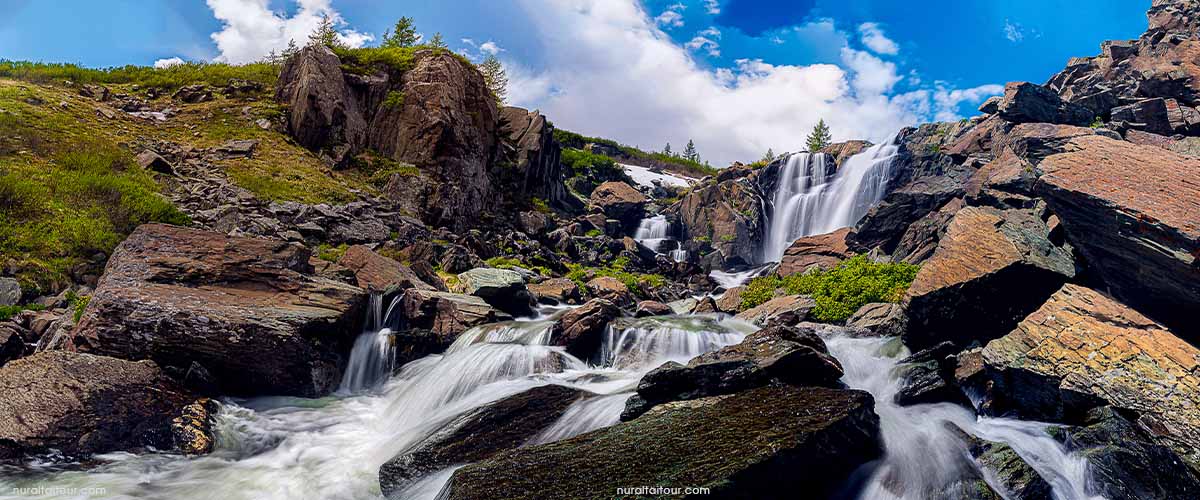 We will return to the family and will have more time to experience local cultures. There are many daily tasks in the nomadic lifestyle, such as women making dairy products in their unique way and men working with livestock, including golden eagles. You’ll practice everything from milking cows to making yogurt, curd, cheese, and more in the countryside. Additionally, you’ll have amazing opportunities to take photos with the golden eagle and its trainer. Playing traditional ankle bone games with local children is one of the fun things to do. Tonight, you’re going to have a local party with the locals. They’ll prepare their very traditional dish called Besbarmak, and you’ll all gather together, inviting the neighbors to have a huge meal. They’ll also have a traditional mini-concert with their traditional instrument called Dombra. Usually, our tours involve song battles between travelers and locals which could give you a great memory of Mongolia. Overnight in a GER.(B/L/D)
We will return to the family and will have more time to experience local cultures. There are many daily tasks in the nomadic lifestyle, such as women making dairy products in their unique way and men working with livestock, including golden eagles. You’ll practice everything from milking cows to making yogurt, curd, cheese, and more in the countryside. Additionally, you’ll have amazing opportunities to take photos with the golden eagle and its trainer. Playing traditional ankle bone games with local children is one of the fun things to do. Tonight, you’re going to have a local party with the locals. They’ll prepare their very traditional dish called Besbarmak, and you’ll all gather together, inviting the neighbors to have a huge meal. They’ll also have a traditional mini-concert with their traditional instrument called Dombra. Usually, our tours involve song battles between travelers and locals which could give you a great memory of Mongolia. Overnight in a GER.(B/L/D)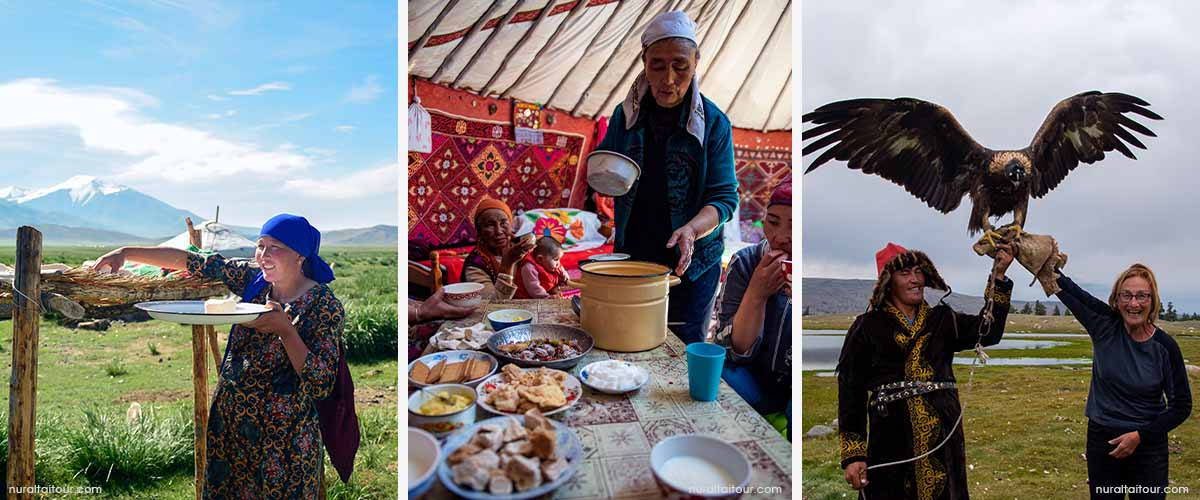
Bid farewell to the family, and leave twin lakes to village Sagsai for about 4-5 hours where you’ll meet the local Uriankhai family and experience their daily life. The Uriankhai is an ethnic group of Mongolians who have dwelled in the western part of Mongolia for hundreds of years. Their language is slightly different from the Khalkh Mongolian language, and their main religions are Buddhism and shamanism. They’ll make us traditional Mongolian vodka from dairies. Regarding their tradition, you’ll have a small archery competition with locals after you learn how to handle the Mongolian bow and arrow. Then, will head back to Olgii town for about an hour. Overnight in a tourist Ger camp.(B/L/D)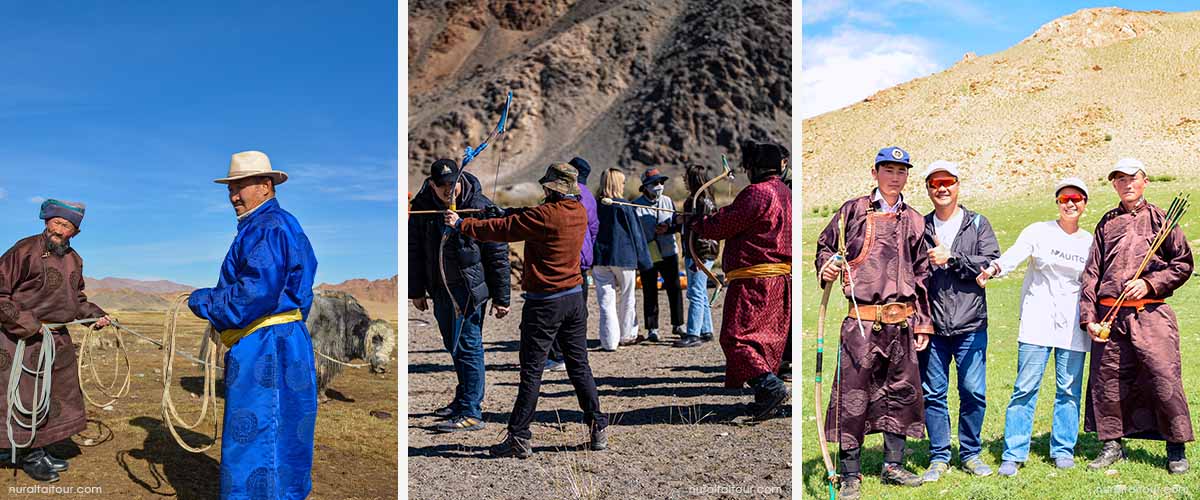
You’ll have an early breakfast at the tourist camp. Then, will get transferred to the airport by drivers and tour guides. We’ll bid farewell, hoping to be a part of your unforgettable vacation and bring some vibrant moments to your life.(B)
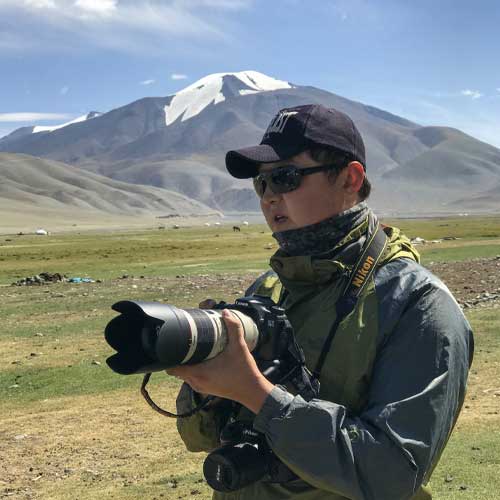
nur altai tour
Hey, this is Nur. Please, leave your message. We'll answer your questions ASAP.
Any quick questions related to The Ultimate Mongolian Journey: From Steppe to Sky?
WhatsApp Us
🟢 Online | Privacy policy
